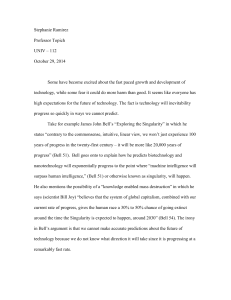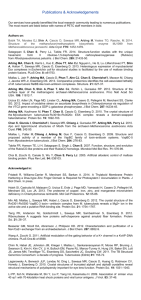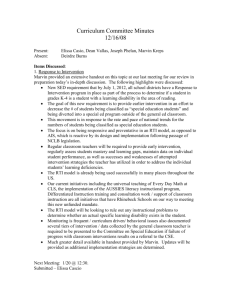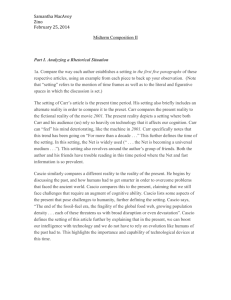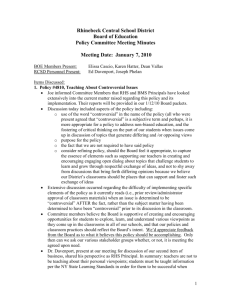Failure to manage HR risks common denominator in global financial
advertisement
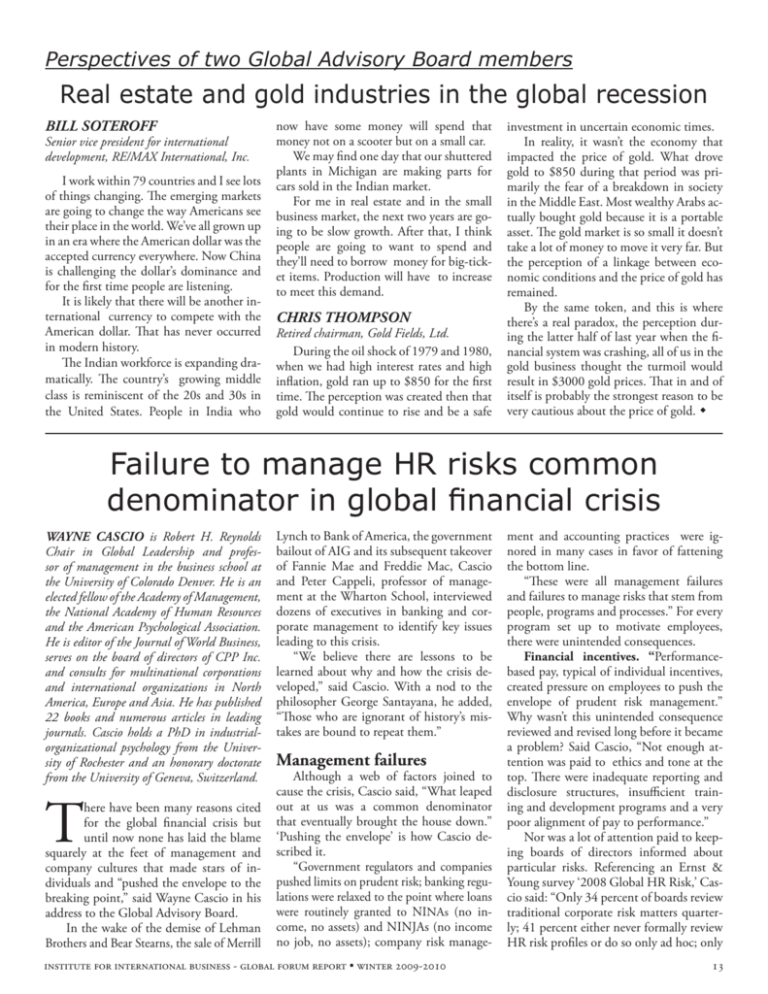
Perspectives of two Global Advisory Board members Real estate and gold industries in the global recession BILL SOTEROFF Senior vice president for international development, RE/MAX International, Inc. I work within 79 countries and I see lots of things changing. The emerging markets are going to change the way Americans see their place in the world. We’ve all grown up in an era where the American dollar was the accepted currency everywhere. Now China is challenging the dollar’s dominance and for the first time people are listening. It is likely that there will be another international currency to compete with the American dollar. That has never occurred in modern history. The Indian workforce is expanding dramatically. The country’s growing middle class is reminiscent of the 20s and 30s in the United States. People in India who now have some money will spend that money not on a scooter but on a small car. We may find one day that our shuttered plants in Michigan are making parts for cars sold in the Indian market. For me in real estate and in the small business market, the next two years are going to be slow growth. After that, I think people are going to want to spend and they’ll need to borrow money for big-ticket items. Production will have to increase to meet this demand. CHRIS THOMPSON Retired chairman, Gold Fields, Ltd. During the oil shock of 1979 and 1980, when we had high interest rates and high inflation, gold ran up to $850 for the first time. The perception was created then that gold would continue to rise and be a safe investment in uncertain economic times. In reality, it wasn’t the economy that impacted the price of gold. What drove gold to $850 during that period was primarily the fear of a breakdown in society in the Middle East. Most wealthy Arabs actually bought gold because it is a portable asset. The gold market is so small it doesn’t take a lot of money to move it very far. But the perception of a linkage between economic conditions and the price of gold has remained. By the same token, and this is where there’s a real paradox, the perception during the latter half of last year when the financial system was crashing, all of us in the gold business thought the turmoil would result in $3000 gold prices. That in and of itself is probably the strongest reason to be very cautious about the price of gold. w Failure to manage HR risks common denominator in global financial crisis Wayne cascio is Robert H. Reynolds Chair in Global Leadership and professor of management in the business school at the University of Colorado Denver. He is an elected fellow of the Academy of Management, the National Academy of Human Resources and the American Psychological Association. He is editor of the Journal of World Business, serves on the board of directors of CPP Inc. and consults for multinational corporations and international organizations in North America, Europe and Asia. He has published 22 books and numerous articles in leading journals. Cascio holds a PhD in industrialorganizational psychology from the University of Rochester and an honorary doctorate from the University of Geneva, Switzerland. T here have been many reasons cited for the global financial crisis but until now none has laid the blame squarely at the feet of management and company cultures that made stars of individuals and “pushed the envelope to the breaking point,” said Wayne Cascio in his address to the Global Advisory Board. In the wake of the demise of Lehman Brothers and Bear Stearns, the sale of Merrill Lynch to Bank of America, the government bailout of AIG and its subsequent takeover of Fannie Mae and Freddie Mac, Cascio and Peter Cappeli, professor of management at the Wharton School, interviewed dozens of executives in banking and corporate management to identify key issues leading to this crisis. “We believe there are lessons to be learned about why and how the crisis developed,” said Cascio. With a nod to the philosopher George Santayana, he added, “Those who are ignorant of history’s mistakes are bound to repeat them.” Management failures Although a web of factors joined to cause the crisis, Cascio said, “What leaped out at us was a common denominator that eventually brought the house down.” ‘Pushing the envelope’ is how Cascio described it. “Government regulators and companies pushed limits on prudent risk; banking regulations were relaxed to the point where loans were routinely granted to NINAs (no income, no assets) and NINJAs (no income no job, no assets); company risk manage- ment and accounting practices were ignored in many cases in favor of fattening the bottom line. “These were all management failures and failures to manage risks that stem from people, programs and processes.” For every program set up to motivate employees, there were unintended consequences. Financial incentives. “Performancebased pay, typical of individual incentives, created pressure on employees to push the envelope of prudent risk management.” Why wasn’t this unintended consequence reviewed and revised long before it became a problem? Said Cascio, “Not enough attention was paid to ethics and tone at the top. There were inadequate reporting and disclosure structures, insufficient training and development programs and a very poor alignment of pay to performance.” Nor was a lot of attention paid to keeping boards of directors informed about particular risks. Referencing an Ernst & Young survey ‘2008 Global HR Risk,’ Cascio said: “Only 34 percent of boards review traditional corporate risk matters quarterly; 41 percent either never formally review HR risk profiles or do so only ad hoc; only institute for international business - global forum report • winter 2009-2010 13 39 percent of boards communicate results from HR risk management teams to corporate risk managers. “The risks fall under the categories of operational, compliance and strategic. There is an under-used level of reporting in all cases.” Reward systems. Cascio challenges the notion that in ‘the war for talent,’ a term coined by McKinsey and Company, the team with the best athletes always wins. “Everybody wants the best and smartest talent, the rainmaker, the A players. In investment banking the competition was intense; everybody wanted the best deal makers but the talent was defined as individual rather than group performance. The poster child for that approach was Enron. At the height of its game Enron was hiring 250 Ivy League MBAs a year, believing that having better educated individuals at all levels is how you out-perform the competition,” said Cascio. “And although Enron’s values were defined in the acronym RICE – Respect, Integrity, Communication, Excellence – none of this ever came up in performance reviews or any other measure of effectiveness. The only thing that counted was getting the deal done no matter how many of those values were trampled in the process. Ultimately, Enron collapsed of its own weight.” But if a strong culture helps steer the ship, why didn’t that work for many of the financial institutions that got into trouble despite having a strong culture? “There was rampant individualism in those organizations,” said Cascio. “Huge rewards were dangled for successful performance and there was little oversight from supervisors. Therefore, the unintended consequences: pressure to maximize individual performance, take outsized risks, hide failures and push the envelope on ethical behavior.” There were many players in this game. n Mortgage lenders Cascio pointed out that loan officers are evaluated on the number and size of the loans they make and their commissions are based on each loan that is sold. No loans, no commissions, no jobs. “The loan officers and brokers were at risk of losing their jobs if they weren’t making loans. However, there were no penalties for making bad loans or for putting out loans that got turned down,” said Cascio. “Before the advent of mortgage backed securities it was important that you knew your neighborhood banker and that the 14 banker knew you; this personal knowledge helped him determine whether or not you were a good credit risk. “But with the advent of mortgage backed securities, there’s little consequence for making a bad loan. The mortgage might be at a different bank and so might the loan officer for that matter. So quality becomes somebody else’s problem unlike the old days when quality was the local banker’s problem.” n Property assessors. “The property assessor certifies that the value of the house merits the size of the loan. He or she gets paid no matter what the appraisal is. But if the appraiser comes up with a value that’s lower than what the loan officer is looking for, he’s probably not going to be rehired,” said Cascio. “Assessors see other professionals overvaluing properties and they get the message: If you want to continue to get work from lending institutions, play ball.” n Capital markets group Bundling and pooling loans is how banks create financial instruments that they sell to other financial institutions. A triple-A rating on these loans increases their investment value in the marketplace, making them easier to sell. “In our research we found that 80 percent of the ratings assigned to mortgage backed securities by private credit agencies was triple-A. That was what allowed bankers and state governments in Europe to purchase them. In Asia banks are not allowed to buy loans that are less than AAA rated. So that triple-A rating gave them the green light to buy, which they did. “Inside the bank at every level – loan officers, underwriters, executives – the pressure was high to keep the loans flowing because that’s how profits are generated.” Is it possible that those in the banking institutions didn’t fully understand the potential outcomes of the risks they were taking? Not likely, said Cascio recalling a statement made by one of the bankers he interviewed: “‘If I get into trouble, I pray to God that the markets will bail me out. I don’t disclose that to people, I don’t let them know that I’ve taken too much of a risk.’” Ordinary people “The talent myth is that stars trump systems; however, smart doesn’t always win,” said Cascio. “In fact, IQ explains less than 10 percent of the variability in occupational success because there are so many other things that go into making a successful person no matter what the job.” The good news is that management systems are a lot cheaper to develop and implement than finding and relying on stars to generate revenue. “It’s companies like Toyota, Procter and Gamble, Goldman Sachs and the U.S. Navy that take ordinary people, put them into systems that are very well developed and allow them to do extraordinary things. That’s the real challenge. In the most successful organizations, it’s the systems that are the stars. The focus is not on individuals but on the organization and its goals,” said Cascio. “Goldman Sachs, one of the few investment banks still doing well, puts a lot of emphasis on teamwork and takes the management of people very seriously. Although they’ve experienced periodic scandals since 1869, none was fatal. The company is an example of what is meant by ‘a learning organization.’ Goldman Sachs is not always first to invest but they make a lot fewer blunders tied to any single executive and they strive to learn from their mistakes. “Corporate and banking scandals of the past decade have two things in common: financial impropriety and a lack of management controls,” said Cascio. “In the current crisis, we have companies with inflated profits and hidden losses and individuals who have made their own performance look better at the expense of the common good.” Opportunity to lead What has emerged from the crisis and its aftermath is “a great opportunity for leaders,” said Cascio. “We begin by taking a look at the incentives that are being offered at every single level and asking: What is it that we’re paying people to do, recognizing that people do what you pay them to do not what you ask them to do.” There is no room for ambiguity in the signals leaders knowingly or unknowingly communicate through their actions and interactions. “It’s important for leaders to be clear about the values and principles they stand for,” said Cascio. “They must live those values every day in everything they do.” Leaders should not assume that employees automatically know what the organization is about. “Employees must be given periodic training in the organization’s policies on ethics, values, accountability, reporting-and-disclosure structures.” Referring to his attendance at the recent World Economic Forum, Cascio said institute for international business - global forum report • winter 2009-2010 he talked with the Forum’s founder who succinctly wrapped up what every leader must learn from this crisis: “At the end of the day, the only thing you’ve got is your reputation. You cannot hide; everything you do is going to be known and it’s going to be public. And your reputation is a nonsalvageable asset.” Cascio was joined by IIB/CIBER faculty director Manuel Serapio in the question-answer period. Please comment on use of the triple bottom line accounting procedure (ecological, social, financial) and how it can be taught in the business school? CASCIO: This morning we did a case study of Coca Cola’s problems dealing with paramilitary groups in Colombia. One of the things I learned from attending the World Economic Forum is that it’s important to take a multi-stakeholder approach to problems that arise in a global environment. So we looked at Coca Cola’s response from the perspective of not only shareholders but also from the perspective of society, workers and suppliers. One of the things we can do in management edu- cation is to get the point across that companies often do well by doing good. The notion of the triple bottom line is a good tool as is the multi-stakeholder approach which looks at the interests of all stakeholders not just one. In international business education, this multi-stakeholder approach is something we need to look at a lot more closely; it’s something that the World Economic Forum is actively promoting. Focusing on these Fortune 500 companies is great but how does that help businesses in Colorado? SERAPIO: Board member Rob Joyce developed a case based on his company, Wheelabrator, a 100-year old company that needs to be entrepreneurial in terms of its approach to global markets. We have used this case to teach international entrepreneurship to our students. Last semester, Rob came to a class on international business and talked to students about challenges Wheelabrator faces as it expands globally. He gave students insight into a major decision he made concerning an acquisition designed to help Wheelabrator better service the markets in China and India. He discussed why that decision was important to the continued growth of the company. The focus is on entrepreneurial and midmarket firms and action learning which is real time, active cases. CASCIO: I agree we have used examples of large companies but by no means are these typical of the things we cover. The multi-stakeholder approach applies no matter what level of company we use as an example; it’s a generic model. And we are always looking to make the course more relevant and timely with input from the Global Advisory Board. A topic area that we usually discuss in these Board meetings is: What should management education as a component of international business education look like? SERAPIO: When we focus on China and India the question we ask is how can Colorado firms – those that are entrepreneurial – play in these markets and be successful? Clearly, the lessons from Wal-Mart may not apply specifically to the small firms we’re working with in China but they are important in that they help create a global vision for all firms. w Global financial crisis testing viability of EU PETER WIDMER is a financial advisor serving clients in the European Union. Previously he was a member of the Group Management Committee of Julius Baer Holding Ltd., responsible for institutional investment activities outside Switzerland. He was also chairman of the board of directors of Julius Baer Investment Management Inc. (New York/London), Julius Baer Investments Ltd. (London) and Julius Baer Kapitalanlage AG (Frankfurt) and a member of the board of directors of Julius Baer Investment Advisory Ltd. (Hong Kong). He has held positions with global finance and banking institutions. Born and educated in Zurich, Widmer holds the Commercial Diploma from the Swiss Business Association. W hen the financial crisis first hit, Europeans blamed Wall Street and absolved themselves of any responsibility. Their attitude: Let the Americans sort it out by themselves and leave us alone, said Peter Widmer in his address to the Global Advisory Board. “Then we realized that this was the first financial crisis in a globalized world. In the securitization process that followed, various big European and even Swiss banks were very active repackaging some of the risky loans and placing them around the world with unsuspecting investors at a good profit.” This strategy might have worked had the toxic assets not “crept up in the most unexpected parts of Europe such as local banks in Germany, Britain and in less sophisticated locations. “Globalization means there is no place to hide,” said Widmer. The financial crisis has tested the viability of the 51-year-old European Union. “Ten years after the creation of the euro, the EU faced its most severe economic and financial test so far and did not fall apart. “In the absence of a constitution and with national priorities still dominating, decisions were taken and implemented in coordination with the US, China and other leading economies.” Even better, Widmer reported, “There were no fights outside the usual horsetrading among EU members. In the June election of the European Parliament (legislature), the economic crisis failed to carry the left-wing socialists to victory. “To everybody’s surprise the centre-right demo- crats and their allies came out on top,” said Widmer. “The five year routine election was carried out by an electorate of 380 million voters in 27 countries, second in size only to India. But voter turnout was the weakest ever at 43 percent although the powers of the Parliament have expanded considerably over the last four years.” Widmer sees this as “yet another proof of the lack of democratic acceptance of the EU by its citizens who still give preference to national issues and priorities and feel that they have little say or impact in Brussels. “Under these circumstances the reelection of José Manuel Barroso for a second term as CEO and president of the European Commission (executive body) seems assured as he has the backing of the major member states.” Eastern Europe woes Eastern Europe economies have turned around but not in a good way. Until the financial crisis cast its giant shadow, the 10 new member states which joined in 2004 had shown the highest rates of economic growth within the Union. Widmer attributed this performance to “catch-up institute for international business - global forum report • winter 2009-2010 15
